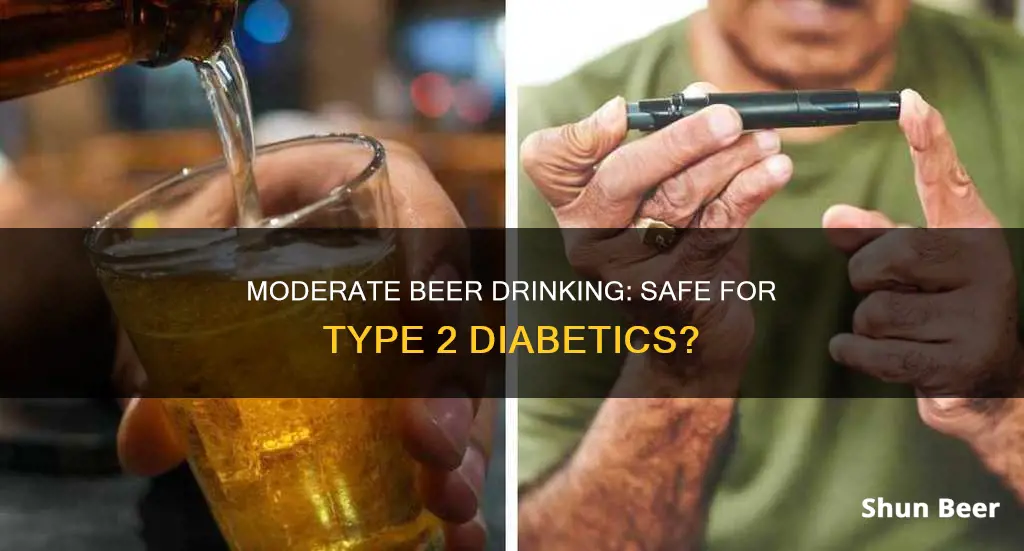
People with type 2 diabetes do not need to abstain from alcohol entirely, but they should be mindful of how much they consume. Alcohol can affect blood sugar levels, and the liver's priority is to clear alcohol from the body, which can slow down carb metabolism and lead to low blood sugar (hypoglycemia). It is recommended that women have no more than one drink per day and men no more than two. Beer is typically higher in carbs than other alcoholic drinks, so it's important for people with type 2 diabetes to be aware of how much they're drinking and to monitor their blood sugar levels.
| Characteristics | Values |
|---|---|
| Can type 2 diabetics drink beer in moderation? | Yes, but it is not without risks. |
| How much is too much? | No more than one drink a day for women and up to two drinks a day for men. |
| How to drink beer safely as a diabetic | Drink in moderation, choose low-sugar or low-carb beverages, never drink on an empty stomach, monitor blood sugar levels, stay hydrated, and avoid drinking if your blood sugar is low. |
What You'll Learn
- Beer is a significant source of carbohydrates, so it can impact blood sugar levels
- Drinking beer may contribute to weight gain over time
- Beer is best paired with a low-carb snack rather than consumed on an empty stomach
- Beer is a diuretic, so it's important to stay hydrated when drinking it
- Beer can be enjoyed in moderation by people with type 2 diabetes, but it's not without risks

Beer is a significant source of carbohydrates, so it can impact blood sugar levels
Beer and Diabetes: What You Need to Know
Beer is a popular alcoholic beverage, but for people with diabetes, it's important to understand how it can affect their health. Here's a closer look at the impact of beer on blood sugar levels and what it means for individuals with type 2 diabetes.
Beer's Carbohydrate Content and Blood Sugar Impact:
Beer is notable for being a significant source of carbohydrates, with an average 12-ounce can containing approximately 13 grams of carbs. This is nearly equivalent to one carb serving, which is defined as 15 grams of carbohydrates for carb-counting purposes. This high carb content means that beer can significantly impact blood sugar levels, and it must be treated accordingly.
When an individual with diabetes consumes beer, the carbohydrates are rapidly absorbed, leading to a quick spike in blood sugar levels. This is because the body struggles to get sugar into the bloodstream for utilisation by the cells, resulting in hyperglycemia, or high blood sugar. Additionally, the liver, which is responsible for storing glucose and clearing alcohol from the body, may be delayed in releasing necessary sugars into the bloodstream, further contributing to potential blood sugar spikes.
Managing Beer Consumption with Type 2 Diabetes:
For individuals with type 2 diabetes, it is important to understand that beer can impact their blood sugar levels. However, this does not mean that they need to completely abstain from beer. Instead, moderation and mindful consumption are key. Here are some guidelines to follow:
- Limit beer consumption to the recommended allowances: For females, this means no more than one 12-ounce beer per day, and for males, no more than two.
- Pair beer with a low-carb snack: Avoid drinking beer on an empty stomach. Instead, opt for a low-carb snack to help slow the absorption of carbohydrates.
- Choose light or low-calorie beers: These options have fewer calories and a lower alcohol content, which can help reduce the impact on blood sugar levels.
- Monitor blood sugar levels: Regularly check your blood sugar before, during, and after drinking beer to ensure you stay within a healthy range.
- Be mindful of diabetes medications: If you are taking diabetes medications, such as insulin or sulfonylureas, consult your healthcare provider before consuming beer, as it can interact with your medication and further lower blood sugar levels.
- Stay hydrated: Beer is a diuretic, so it's important to drink water alongside beer to maintain proper hydration and electrolyte balance.
In conclusion, while beer is a significant source of carbohydrates and can impact blood sugar levels, individuals with type 2 diabetes can still enjoy it in moderation by following the guidelines outlined above. It is important to work with a healthcare professional to determine what is safe and to individualise recommendations based on specific needs and medications.
The Michigan Beer Chair: Engineering a Relaxing Experience
You may want to see also

Drinking beer may contribute to weight gain over time
People with type 2 diabetes can usually drink alcohol in moderate amounts. However, drinking beer may contribute to weight gain over time.
Beer contains calories, with an average beer containing 150 calories and a light beer containing around 100. If you're not careful, drinking beer can lead to significant weight gain. The more beer you drink, the more fat your body creates. This is because your body stops burning fat when it detects alcohol, instead concentrating on getting rid of the liver's byproducts from alcohol consumption.
The effects of alcohol on the body can wreak havoc on your appetite, too. You may find yourself craving unhealthy, fatty foods such as wings, pizza, and burgers, which are also high in calories and fat.
To avoid weight gain from drinking beer, you can try alternating alcoholic or non-alcoholic beers with water, sticking to light beers, or drinking only one heavier beer instead of multiple lighter ones. You can also try to avoid eating while drinking, or opt for healthier, protein-rich snacks.
Drinking Beer and Driving in the UK: What's Allowed?
You may want to see also

Beer is best paired with a low-carb snack rather than consumed on an empty stomach
People with type 2 diabetes can usually drink beer, but it's not without risks. Beer is a significant source of carbohydrates, so it can impact blood sugar. It can also be high in calories, so drinking beer may contribute to weight gain over time. Some types of beer can be higher in alcohol, too.
Drinking alcohol can cause hypoglycemia, or low blood sugar, so it's essential to keep this in mind if you plan on drinking. This happens because your liver, where glucose is stored until the body needs energy, is also responsible for clearing alcohol from your system, so it may be delayed in releasing necessary sugars into the bloodstream.
To avoid hypoglycemia, don't drink on an empty stomach. Make sure you have food handy while you're drinking and keep an eye on your blood sugar. It's best to pair beer with a low-carb snack rather than consuming it on its own. This is because the liver can't make glucose and metabolise alcohol at the same time, so it will focus on dealing with the alcohol first. As a result, blood glucose levels remain low.
If you are going to drink beer, it's a good idea to consume it with food. This will be better for your blood sugar than drinking on an empty stomach. It's also important to stay hydrated by drinking water with your beer, as beer is a diuretic that depletes your electrolyte balance.
The best choice is low-calorie or mild beer. Beer's sugar content takes longer to flush away, so it's important to be mindful when consuming beer when you have diabetes.
MLB Dugout Drinking Culture: Beer and Beyond
You may want to see also

Beer is a diuretic, so it's important to stay hydrated when drinking it
Beer is a diuretic, meaning it can increase the urge to urinate and can cause dehydration. This can lead to a loss of electrolytes and an electrolyte imbalance in the body. Therefore, it is important to stay hydrated when drinking beer, especially if you have type 2 diabetes.
Drinking water alongside beer can help maintain hydration levels and regulate blood sugar. It is recommended that men aim for approximately 15 cups of water per day, while women should aim for about 12 cups. Checking the colour of your urine can also help monitor hydration levels; light yellow urine indicates adequate hydration.
Additionally, drinking water can help dilute the blood, which in turn lowers blood sugar levels. This is especially important for individuals with type 2 diabetes, as they need to carefully manage their blood sugar levels.
To maintain hydration and minimise the diuretic effects of beer, it is advisable to drink water between alcoholic beverages. Staying hydrated can also help reduce the risk of a hangover, as dehydration is a contributing factor to hangover symptoms.
It is worth noting that drinking water instead of beer or other alcoholic beverages is always the healthier option, as water has a neutral effect on blood sugar and does not contain any calories.
Beer and Phentermine: What's the Harm?
You may want to see also

Beer can be enjoyed in moderation by people with type 2 diabetes, but it's not without risks
People with type 2 diabetes do not need to abstain from alcohol entirely, and can enjoy a beer in moderation. However, there are some important safety considerations to keep in mind.
Beer is a significant source of carbohydrates, so it can impact blood sugar. Beer also contains calories, and drinking beer may contribute to weight gain over time. Beer can also be high in alcohol, which affects the liver's ability to produce glucose. This can lead to low blood sugar (hypoglycemia).
Moderate alcohol consumption is generally considered safe for people with type 2 diabetes. The 2020-2025 Dietary Guidelines for Americans recommend that women limit their alcohol intake to one drink per day, and men to two drinks per day. One 12-ounce can of beer is considered one drink.
Drinking any form of alcohol can affect blood sugar levels, so it is important to monitor your intake and be aware of the symptoms of hypoglycemia, which include dizziness, loss of consciousness, and confusion. Alcohol can also interact with diabetes medications, increasing the risk of hypoglycemia.
If you have type 2 diabetes and choose to drink beer, it is important to do so in moderation and to pair it with a low-carb snack. Drinking on an empty stomach can increase the risk of hypoglycemia. It is also important to stay hydrated by drinking water and to monitor your blood sugar levels before, during, and after drinking.
Ash Wednesday: Beer Drinking and Religious Observance
You may want to see also
Frequently asked questions
Yes, type 2 diabetics can drink beer in moderation. However, it is important to be mindful of how much you consume, as beer can impact blood sugar levels and contribute to weight gain over time. It is recommended to limit consumption to one to two 12-ounce beers per day.
Drinking beer can cause fluctuations in blood sugar levels, leading to either hyperglycemia (high blood sugar) or hypoglycemia (low blood sugar). Beer is also high in calories and carbohydrates, which can affect weight management. Additionally, drinking alcohol can interfere with diabetes medications and increase the risk of diabetes-related complications.
Some studies suggest that moderate alcohol intake may have potential health benefits for people with type 2 diabetes. For example, drinking red wine in moderation has been linked to a reduced risk of heart disease. However, it is important to note that the risks of drinking alcohol may outweigh the benefits, and individual experiences may vary. It is always best to consult with a healthcare professional for personalized advice.







